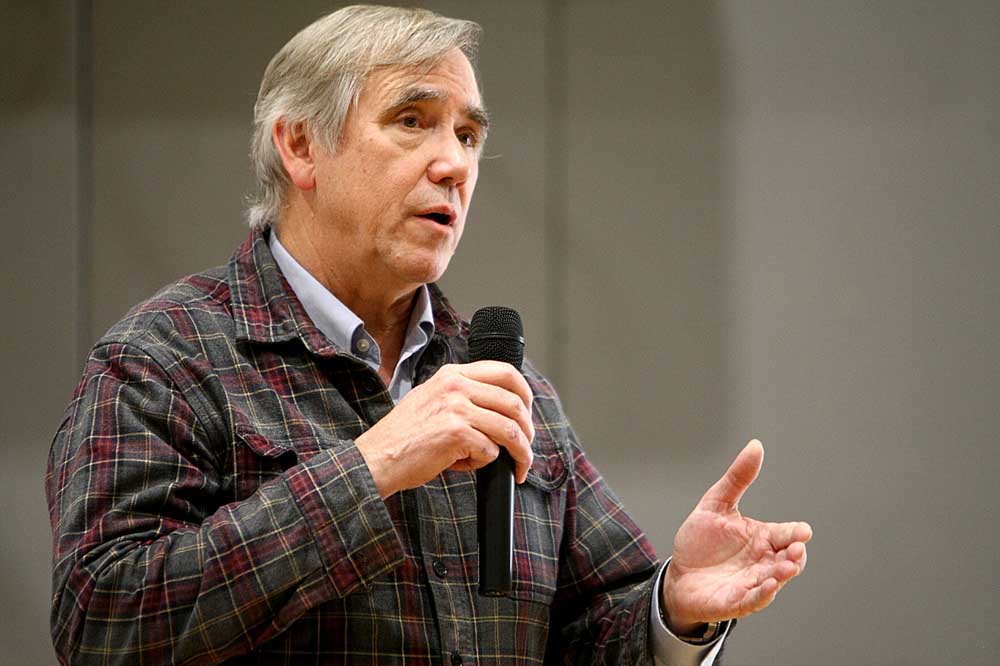Capital Chatter: Why the fur trapping bill and other minor measures are going nowhere
Published 8:00 am Thursday, March 23, 2017

- Capital Chatter: All sides waiting for Brown to lead
The big issues in the 2017 Legislature remain the same: balancing the state budget and coming up with a transportation-finance package. Legislative leaders are trying not to let other topics interfere with finding agreement on those key issues among majority Democrats and minority Republicans, and between the House and Senate.
That is why divisive issues that are outside the Democrats’ core agenda, such as firearms regulation and un-regulation, are unlikely to reach the House or Senate floor for a vote.
Trending
And that is why Senate President Peter Courtney is not pushing his Senate Bill 6, which would have required trappers to check their traps for fur-bearing animals every 24 hours instead of the current 48 hours.
A bill that Courtney introduced in honor of the late Sen. Alan Bates, D-Ashland, has been equally controversial. Senate Bill 3 would permanently ban use of suction dredges for mining in some areas but end a moratorium on their use in other areas. To some people, the issue involves the same arguments of personal freedoms vs. government restrictions as in the armed occupation of the Malheur National Wildlife Refuge last year. However, the bill has been amended and might gain bipartisan support in the Senate.
• The importance of one vote: Democrats hold a 17-13 edge in the state Senate, where passing a bill takes 16 votes. That explains why action has been slowed on a bill that would raise the age to 21 for purchasing cigarettes and other tobacco products.
Senate Bill 754 has bipartisan sponsorship in the House. But in the Senate, it passed out of the health care committee March 14 on a 3-2 party-line vote. On Wednesday, floor action was postponed for at least a day, until the 16 Democratic senators supporting the bill would be present.
• Constituents do come first: Most legislators love being visited by constituents. (Tip: Make an appointment.) Sen. Courtney, D-Salem, recently got so wrapped up in giving visitors a Senate tour that he missed a meeting with State Treasurer Tobias Read and had to reschedule it.
• Neighborly bipartisanship: The Oregon Legislature is more collegial and bipartisan than people might realize. For example, Republicans and Democrats sit next to each other instead of being on separate sides in committees.
Trending
When Rep. Deborah Boone, D-Cannon Beach, was late to Wednesday’s meeting of the House Committee on Energy and Environment, her colleague Rep. Werner Reschke, R-Klamath Falls, quietly filled her in on what had transpired so far. The committee also allowed her to retroactively cast votes on the bills that already had been considered during the meeting.
In another example of bipartisanship, state Rep. David Brock Smith, R-Port Orford, and U.S. Sen. Jeff Merkley, D-Oregon, are co-conveners of the Sudden Oak Death Task Force. The disease has killed hundreds of thousands of tanoak trees in Curry County, and millions of trees in coastal California.
• Oregonians make a difference: The aforementioned House environment committee on Wednesday held a public hearing on controversial bills regarding water rights. There was strong testimony on both sides. A work group is trying to find common ground.
Committee members seemed particularly attentive to the testimony of Ronnie Daniels of Sheridan, a highway flagger who drove up from his job in Roseburg to discuss state water policy and its place in the state budget. It’s rare that an average person is so well-versed on state budget issues.
The committee’s chair, Rep. Ken Helm, D-Beaverton, is as public-focused a committee chair as I have seen this year. Unlike some chairs, he does not cut off a public hearing after an hour or so — a practice that riles Oregonians who have taken time to show up and then don’t get to testify.
On Wednesday, as he has before, Helm stayed to hear the testimony of every person who had signed up. By the end, he and Reschke were the only legislators still there.
Helm also gave each person three minutes to testify — some committee chairs allow two minutes — and rarely interrupted people who went long.
• Amazing timing: During a committee hearing on the Reproductive Health Equity Act (House Bill 3391)
Rep. Cedric Hayden, R-Roseburg, mentioned that he had been waiting for weeks to get a legislative legal opinion on whether the Oregon bill would conflict with federal law. Miraculously, the requested opinion from the Office of the Legislative Counsel arrived in his email a few moments later.
Committee meetings and legislative floor sessions are televised and can be watched throughout the Capitol, as well as online.
• Wrong DMV: A legislator recently sent out a newsletter that referred to the “Oregon Department of Motor Vehicles.” There is no such beast.
The DMV lost its department status ages ago when it became a branch of the Oregon Department of Transportation. In order to keep the DMV acronym in Oregon, the agency’s name was changed to the awkward moniker of Driver and Motor Vehicle Services Division.
Fortunately, no one calls it DMVSD.
• Headlining History: The Willamette Heritage Center, which is across from Willamette University and down the street and around the corner from the Oregon Capitol, will host its 25th Annual Heritage Awards on April 7.
The theme is “Headlining History,” which is described as “a celebration of the area’s rich history in journalism.” The program will focus on the work of Gerry Lewin, a longtime photographer for the Capital Journal and then the combined Statesman Journal. Gerry has donated the bulk of his photography to the Willamette Heritage Center.
I loved working with Gerry at the Statesman Journal. One of my favorite anecdotes is from the era before cell phones, digital photography and GPS systems:
A terrible windstorm had descended on the Oregon Coast, with conditions so bad that some news outlets dared not send staff to the scene. Gerry and a Statesman Journal intern made it to the coast, but there was no way for them to get back safely to Salem with Gerry’s photos. At the behest of newspaper management, they found motel rooms and checked in for the night, or so we thought. After ensuring that the intern was safe at the motel, Gerry headed back to Salem.
Highway 18 and other coastal routes were closed. But Gerry knew the Coast Range from decades of journalism. He traveled logging roads and other backroads in the dark, pushing downed trees out of his path with his little sports car. We were stunned when he walked into the newsroom with his film for processing. But that was Gary: He made deadline, with terrific photos in hand.
Dick Hughes has been covering the Oregon political scene since 1976, including working at the Statesman Journal for almost 35 years. He is now a freelance writer. Contact him at TheHughesisms@Gmail.com.





